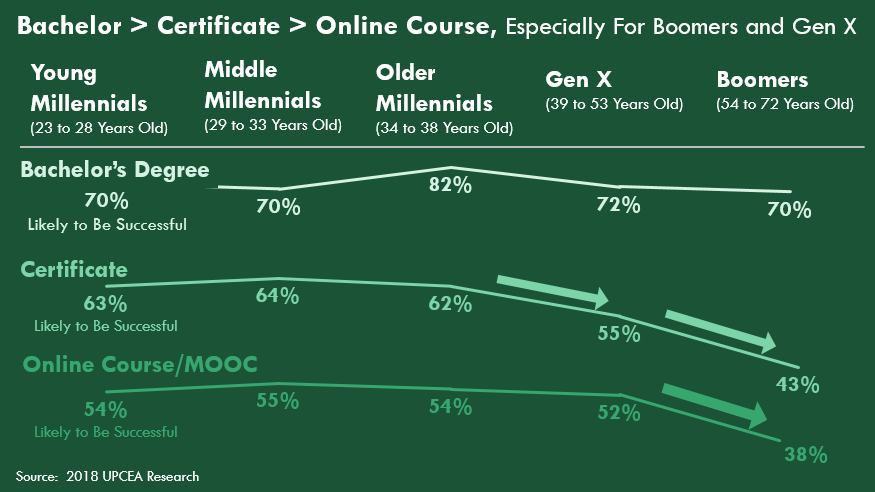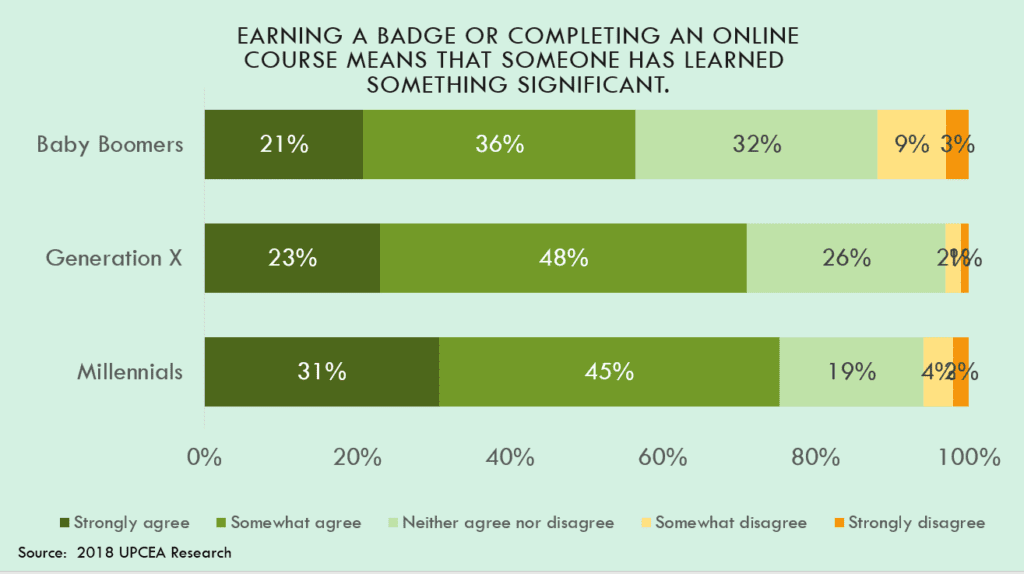Fixing Higher Education As We Move Into the New Economy
Is the degree dead, dying, or about to thrive in the new economy? Over the past two decades, higher education has adapted with online master’s and bachelor’s degrees. However, it took two decades to fully embrace the changes of the evolution of the Internet economy dovetailing into the mobile economy. These economies changed commerce, retail, healthcare, communications, and transportation, but has education kept pace and if so, in what ways? While these economies mature, the automation economy has begun. And like the creation of online degrees, higher education needs to yet again innovate and adapt. During the evolution of the Internet and mobile economies, some institutions laid out very specific strategies, while others “MacGyver’ed” their way through or hired third-parties to help deliver content. Others chose to ignore the signals and some faded away.
In the automation economy, the way traditional and adult students learn will change, as will how organizations train and retain employees. How higher education responds will define their success or failure as industries respond to automation, analytics, and robotics among other technologies. Higher education strategies are dependent on understanding the balance of supply and demand for credentials. In previous research, UPCEA and Pearson have shown that “supply” in the forms of growth in badging and alternative credentials is growing, but at a slow pace.
On the demand side, interests or preference in educational credentials beyond the degree is also growing, while traditional campus-based education has been in decline. In fact, recent UPCEA research shows that preference and adoption of alternative credentials is high while belief that the bachelors degree is in decline, a warning sign for higher education. In a 2018 UPCEA survey of over a thousand Millennial (those born between 1980 and 1996), Generation X (those born between 1965 and 1979) and Baby Boomer (those born between 1946 and 1964) managers, agreement that credentials that are not a bachelor’s degree have value differ by generation. Figure 1 shows that Millennial managers are more likely to believe that an employee can be successful with other forms of educational credentials such as an online course, Massive Open Online Course (MOOC) certificate, or educational badge.
Figure 1: Belief that an Employee can be Successful by Generation and by Credential

Higher education leaders, faculty, and staff need to embrace the fact that an undergraduate or graduate degree is not the only (or primary) credential for success in the new economy. It also is not going to disappear, but it does need to have stronger alignment to employment and outcomes. For programs and degrees that serve the Millennial or Generation Z populations, rebuilding existing relevant degrees or revising existing degrees should be considered. The delivery and packaging of these degrees into badges and stackable certificates leading to degrees should be considered. Figure 2 shows generational differences regarding whether a person completing a badge or online course has learned something significant, with Millennials being more likely to agree with the statement.
Figure 2: The Value of a Badge or Completing an Online Course

Either the degree will adapt to the new economy or the new economy will create solutions, such as employers developing their own ecosystems to include pre-employee training similar to college and post-college education to develop and retain employees, most likely in the form of training that certifies their own employees or employees within specific industries or occupations. Institutions need to re-evaluate their product lifecycles in the new economy as to whether they want to extend program or degree shelf lives through re-design and innovation, or accept the gradual declines of a mature or declining market.
Learn more about UPCEA's expert consultants.
Do you need help with your PCO unit or campus? We can help. Contact UPCEA Research and Consulting for a brief consult. Email [email protected] or call us at 202-659-3130.
Trusted by the nation's top colleges and universities, UPCEA Research and Consulting provides the best value in the industry today. UPCEA's industry experts have years of experience in Online and Professional Continuing education - put them to work for you!
UPCEA Research and Consulting offers a variety of custom research and consulting options through an outcomes-focused pricing model. Find the option(s) that best suit your institution.
Learn more about UPCEA Research & Consulting
The UPCEA Difference
Unmatched Experience: For more than 100 years, UPCEA consultants have exclusively served the needs of online and professional continuing education programs. UPCEA consultants leverage their extensive industry expertise to expedite solutions, anticipate upcoming shifts, and offer distinct best practices, effectively aiding clients in achieving their goals.
Cost Effectiveness: As a nonprofit, member-serving organization, we provide unmatched value, allowing you to maximize limited research and consulting budgets.
Action in Motion: Our cadre of experienced, skilled authorities and expert practitioners propels you forward, translating research and consulting into impactful implementation, a distinctive hallmark of UPCEA. Our team of current and former institutional leaders will support you, turning research and consulting into action.
Mission Alignment: Like you, our mission is to enhance and expand educational opportunities and outcomes for adult and other non-traditional learners. We share your values and work in partnership with you to advance access and excellence in education.
